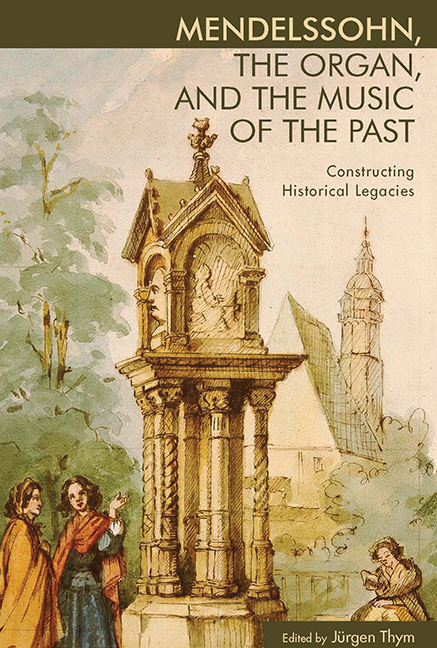Book contents
- Frontmatter
- Dedication
- Contents
- Acknowledgments
- Introduction: Of Statues and Monuments
- Part One Composition and Tradition
- Part Two Mendelssohn and the Organ
- 4 Mendelssohn and the Organ
- 5 Some Observations on Mendelssohn's Bach Recital
- 6 “He Ought to Have a Statue”: Mendelssohn, Gauntlett, and the English Organ Reform
- 7 Mendelssohn's Sonatas, Op. 65, and the Craighead-Saunders Organ at the Eastman School of Music: Aspects of Performance Practice and Context
- Part Three Mendelssohn's Inherited Legacies in Context
- List of Contributors
- Index
5 - Some Observations on Mendelssohn's Bach Recital
from Part Two - Mendelssohn and the Organ
Published online by Cambridge University Press: 14 March 2018
- Frontmatter
- Dedication
- Contents
- Acknowledgments
- Introduction: Of Statues and Monuments
- Part One Composition and Tradition
- Part Two Mendelssohn and the Organ
- 4 Mendelssohn and the Organ
- 5 Some Observations on Mendelssohn's Bach Recital
- 6 “He Ought to Have a Statue”: Mendelssohn, Gauntlett, and the English Organ Reform
- 7 Mendelssohn's Sonatas, Op. 65, and the Craighead-Saunders Organ at the Eastman School of Music: Aspects of Performance Practice and Context
- Part Three Mendelssohn's Inherited Legacies in Context
- List of Contributors
- Index
Summary
There can be little question that Felix Mendelssohn Bartholdy was the most influential champion of J. S. Bach's organ works during the early Romantic era. As a performer, editor, composer, antiquarian, and all-around ambassador, he occupied himself with this music his entire life. In so doing, he helped to bring a historical repertory into the mainstream of musical life in the early nineteenth century.
Of particular importance is the organ recital given by Mendelssohn on August 6, 1840, at the church of St. Thomas in the city of Leipzig, where he had lived since 1835. On that occasion—and for the filrst and only time in his career as an organist—he offered the public a full-length, all-Bach program, played, no less, in the same organ loft where the great Bach had so often held forth as Thomas-Kantor. And he did so expressly to raise money for a monument to Bach in Leipzig. That monument (see filg. 5.1), which Mendelssohn also helped to design, still stands today just yards from the former site of St. Thomas's School (razed in 1902). Fittingly, the east side of the structure shows an angel playing the organ. All things considered, this performance ranks as the most famous and important organ recital in the history of music.
Mendelssohn's recital is documented primarily by the handbill for the event and by Robert Schumann's review of the performance, published about a week later in the Neue Zeitschrift für Musik. Schumann's personal copy of the program (which unfortunately contains no handwritten annotations) is given in chapter 4, as filgure 4.1. This document lists, in order, the day of the week, date, location, performer's name, repertoire, and starting time. Also provided are two paragraphs explaining how the proceeds are to be used and where tickets may be purchased. The wording, layout, and typeface match the handbills for concerts at the Leipzig Gewandhaus during Mendelssohn's tenure there as conductor. Between two improvisations (see discussion below) six different Bach works were played, representing six different compositional genres— fugue, chorale, prelude, passacaglia, pastorale, and toccata—but symmetrically arranged into two groups of three works each.
- Type
- Chapter
- Information
- Mendelssohn, the Organ, and the Music of the PastConstructing Historical Legacies, pp. 111 - 121Publisher: Boydell & BrewerPrint publication year: 2014



